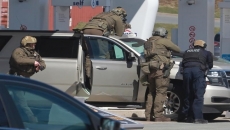Despite a surge in demand due to COVID-19, many distress centres across Canada are dangerously close to folding thanks to major declines in both volunteers and revenue. Stephanie MacKendrick, CEO of Crisis Services Canada, which runs the only national suicide-specific helpline in Canada, says her organization relies on a network of approximately 100 community distress centres across the country to field calls from people.
Those centres, which also respond to requests from people looking for other crisis and mental health services or information, have seen 30 to 50 per cent more crisis calls since the pandemic started, which MacKendrick described as a "huge increase."
COVID-19 is clearly driving much of the demand. According to information compiled by Crisis Services Canada, about 26 per cent of calls and text messages to the national suicide prevention service were related to COVID-19 since March 26.
The severity of these interactions has also increased. If someone reaches out for help and is determined to be at imminent risk of harm, the person taking the call contacts emergency services. These are called "active rescues."
Although these calls form a relatively small percentage of interactions, there were 62 per cent more active rescues this month than compared to the same month last year. Between January and April of this year, there has been an increase of 34 per cent.
"We're looking into pinpointing exactly why that is, but I think given that people are being cautioned about going to emergency rooms or calling in emergency services, a probable cause is people are not reaching out until it's a crisis," she said.
Yet even as they face more demand, distress centres across Canada have seen a dramatic decline in volunteers, which are vital to the operations of these centres. Some are reporting a loss of up to 90 per cent of their volunteers.
While centres have started turning to paid staff to make up the difference, their cash flows have also been hit hard as their main sources of revenue — training and workshops — have dried up overnight due to the pandemic.
MacKendrick calls this the "perfect storm" for these centres — and for the entire system charged with helping Canadians in crisis.
She likened the situation to the concerns now being expressed about long-term care centres, where COVID-19 outbreaks are laying bare a fragile, underfunded and under-resourced system that has led to hundreds of deaths across the country.
As a result, Crisis Services Canada has issued an urgent request to Ottawa asking for $15 million in emergency funding to ensure distress centres don't have to close their doors.
"In the pandemic we have discovered very quickly how important (distress centres) are and I think the realization has hit of how vulnerable that sector is," MacKendrick said.
"By intervening and having someone to talk to, it keeps people out of emergency rooms, it reduces the calls to 911 to bring in emergency services, and in a pandemic, that's especially important."
Elizabeth Newcombe is executive director of the Vancouver Island Crisis Society and also part of the Crisis Line Association of B.C., which represents 14 distress centres in British Columbia.
She says her centre doesn't rely on volunteers as much as other centres. Even so, additional expenses for new paid staff, training and setting up employees to work remotely has hiked her expenses by $20,000 a month.
"Other distress centres are having to pour out that money to get staff to take the calls because volunteers are not coming in, so that's that perfect storm — increased call volume, less staff to take the calls," Newcombe said.
"We're doing it, we're getting those people in place, but without money, some of these distress centres will not be able to continue, they won't have the budgets. Their services will shut down."
Mara Grunau, executive director of the Centre for Suicide Prevention in Alberta, says research on the impacts of economic downturns show that suicide rates often go down at the outset of a crisis. But as time goes on, the cumulative effects lead to spikes 12 to 18 months later.
"We're nervous, we're definitely nervous," Grunau said.
"It's wonderful that the government has come out with all kinds of programs to help people with their physical needs. ... But once people's food and shelter have been taken care of, I think we're going to see a giant emergence in people's mental health needs. And I think what the distress centres and crisis lines are seeing is it's already starting, it's already emerging."
That's why those who work in suicide prevention are doubly concerned about the duress being faced by the system. The sector has always quietly made do, operating on shoestring budgets under a patchwork of funding models — some are non-profit, some rely on donors with some provincial help — but with no national voice to help them raise the alarm, MacKendrick said.
"It's a disaster waiting to happen. People need someone on the line when they call."





